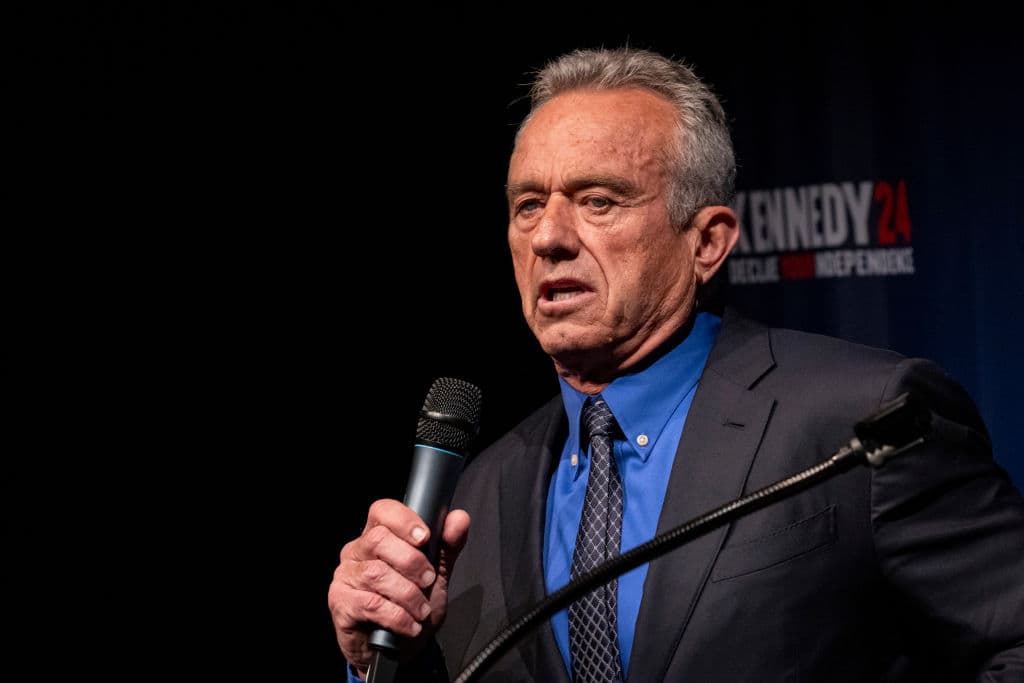RFK Jr. Campaign Calls Withholding of Secret Service Protection ‘Unprecedented,’ Speculates on Political Motive
‘It appears that the unprecedented withholding of Secret Service protection is designed to drain campaign funds,’ an aide to Kennedy says.

The Democrat-turned-independent, Robert F. Kennedy Jr., is walking the road to the White House without the Secret Service protection offered to other candidates. His campaign suspects that the denial is dangerous political gamesmanship by the Biden administration aimed at punishing a rival.
“It is impossible to know for sure,” a campaign representative for Mr. Kennedy tells the Sun, “but it appears that the unprecedented withholding of Secret Service protection is designed to drain campaign funds, and to adversely affect the campaign’s logistical effectiveness.”
In a Sunday post on X, Mr. Kennedy wrote, “During the 35 years that I’ve known Joe Biden, he’s always demonstrated his core decency. He has shown his affection and esteem for my family by displaying a bust of my father,” the slain Senator Robert F. Kennedy, “in the Oval Office.”
Mr. Kennedy then pivoted. “I suspect,” he wrote, “that the White House decision to deny me Secret Service protection — and many other more important decisions — are being made, not by the president himself, but by the anonymous men in lanyards who now seem to be running our government.”
The Secret Service began protecting presidential candidates after the assassination of Mr. Kennedy’s father in 1968. A law passed by Congress soon afterward expanded the list of people eligible to avoid future tragedies.
The law requires details for “major presidential and vice-presidential candidates,” but gives the homeland security secretary, after consultation with a bipartisan advisory committee, flexibility to judge who counts as “major” and when. Even though Mr. Kennedy’s uncle, Senator Edward Kennedy, wasn’t a presidential candidate in 1972, President Nixon decided to assign him a detail just to be safe.
President Obama was granted protection as a primary candidate in October 2007, more than a year before the election. Homeland Security told CNN then that though there was “no known specific or credible threats,” as a Black man drawing huge crowds, he was at risk.
Both RFK Sr. and his brother, President Kennedy, were assassinated, something the Secret Service noted in its June Protective Intelligence Assessment of Mr. Kennedy. “Kennedy’s family history,” it wrote, “perceived controversial stance on vaccines, and his status as a challenger to President Biden … elevates his risk for adverse attention.”
The report listed several threats. One “known subject regularly sends threatening emails, stating he will ‘bury’ Kennedy, ‘everyone will die,’ and that he will make Kennedy ‘suffer.’” Another sent “a nonsensical letter to the hotel where Kennedy held his presidential campaign announcement and even warned a ‘madman’ may commit a ‘serious terrorist act.’”
In July, Mr. Kennedy’s request for protection cataloged 67 pages of the security risks he faces. In September, an armed man was apprehended at a campaign event and in October, a man was arrested twice for trying to break into his house at Los Angeles.
Mr. Kennedy, home during the attack, requested protection a third time after the incident. The homeland security secretary, Alejandro Mayorkas, wrote to him in December that, after consulting with the advisory committee, “Secret Service protection … is not warranted at this time.”
“I’m the only presidential candidate in history,” Mr. Kennedy responded on X, “whose request has ever been denied.” The candidate has the means to hire private security, but the Secret Service is the gold standard and, as his campaign stated, paying bodyguards is a financial drain. Even the billionaire H. Ross Perot was offered protection during his independent runs in 1992 and 1996. He often said he didn’t need it because “everybody loves me.”
President McKinley’s assassination in 1901 prompted the Secret Service to assume the role of protecting presidents, just as RFK Sr.’s expanded that mandate. McKinley had a similar boast to Perot’s. “No one would wish to hurt me,” McKinley said. He was shot that very hour.

